Q3 cryptocurrency market value plummeted 100 billion US dollars, mainly due to investors' concerns about the blocked institutions entering the market

The third quarter report of digital currency released by CoinGecko recently showed that the overall performance of cryptocurrency in the third quarter was not satisfactory.
The third quarter is a relatively stable quarter for Bitcoin. It remained above $10,000 for most of the third quarter and then fell sharply by 17.6% in the last week of September. Overall, Bitcoin fell 24% at the end of the quarter, starting at $10,888 and eventually closing at $8,271.
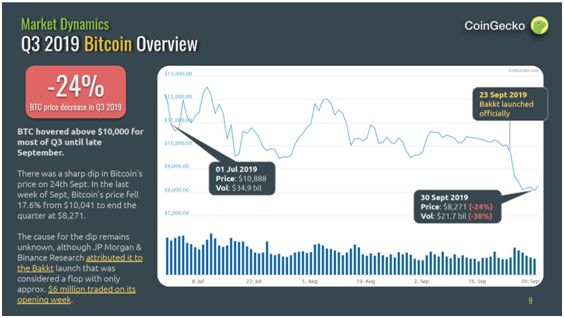
- The giant digital currency may be the most valuable asset left by this wave of blockchains.
- The new blockchain law will enter into force in Liechtenstein
- Where are the giants withdrawing, and where are the opportunities and challenges of Libra? | 2019 CCF Blockchain Technology Conference Heavy Round Table
Although Bitcoin fell 24% in the third quarter, other cryptocurrencies fell even more. Among the top five cryptocurrencies in the market capitalization, Ethereum fell 39%, XRP fell 36%, Bitcoin cash fell 43%, and Litecoin fell 54%.
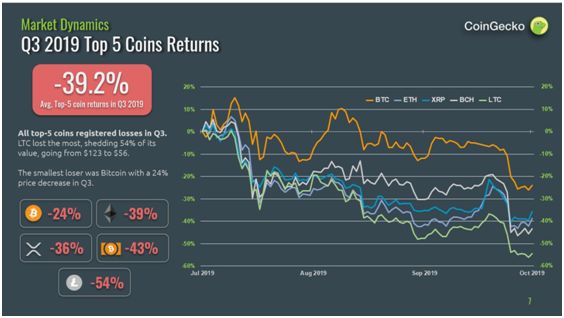
The overall market value of cryptocurrencies fell by 29.1%, or close to $100 billion.
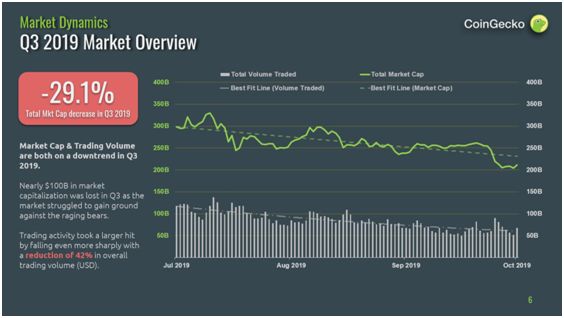
Among the top 30 cryptocurrencies, the market power of Bitcoin increased from 65.0% to 70.4% (+ 5.4%). Stabilized coins also saw their market dominance and market value rankings rise in the third quarter. Although ETH and XRP remain in the second and third positions, their share of the market has declined.
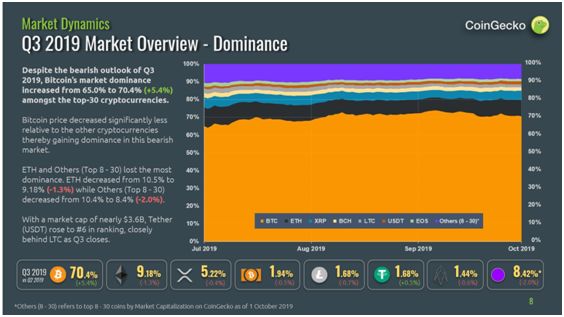
From the second quarter to the third quarter, the ranking of the top 30 cryptocurrencies, except BTC, ETH, XRP rankings remain unchanged, and other rankings have changed. Overall, both stable and platform coins performed well.
The USDT advanced three places in the sixth position. The USDC ranked in the top 30 this quarter, ranking 24th.
Platform currency. BNB has a correction, down one place, ranking eighth. HT entered the top 30 in the second quarter, and rose by 5 places this season, ranking 15th. OKB dropped to a number of places in the second quarter in the 27th place, and this season has increased by 9 places, ranking 18th.

In the past quarter, the cryptocurrency industry has experienced rapid growth in the derivatives sector. On CoinGecko, the number of tracked derivatives exchanges increased by 300%, from six exchanges to 17 exchanges.
Binance, the largest spot exchange based on volume, is currently involved in the derivatives market. It launched Binance Futures and acquired Jex, a small derivatives exchange.
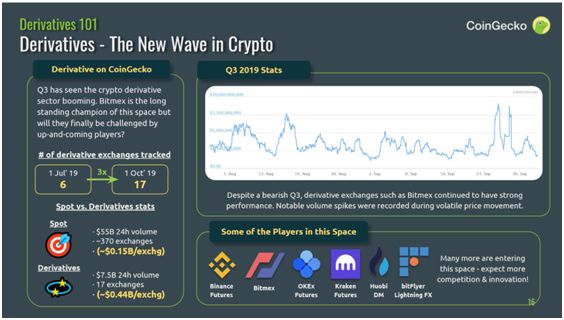
In the past year, the DeFi (decentralized finance) sector has shown strong growth. In a year, the number of ETHs locked in smart contracts with power DeFi has tripled to about 2.9 million. To create a more efficient money market, DeFi has seen strong growth in application types.
The most popular applications in DeFi are loans, derivatives, decentralized exchanges (DEX) and payment services.
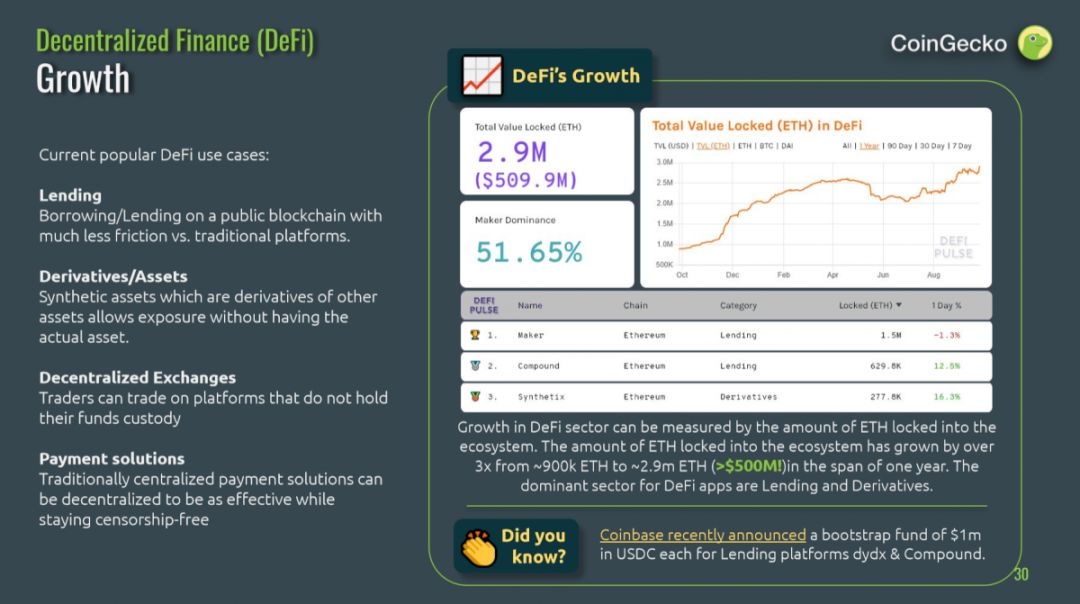
The number of active DApps is 1,350, accounting for 48.4% of the total DApp (the total number of DApps is 2791). Among them, there are 604 on the Ethereum, which is far ahead. There are 346 on EOS, 299 on STEEM, 16 on TRON, and 19 on IOST.
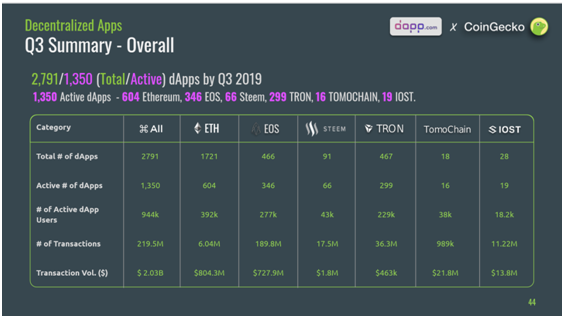
According to SFOX's latest report, the reversal of digital currency performance is mainly due to unexpected bearish signals from institutions and businesses interested in Bitcoin, but concerns about these signals may be overdone.
Current encryption market prospects: neutral
According to the calculation and analysis of SFOX, the SFOX multi-factor market index, which was defined as a mild bullish one month ago, has become neutral on October 7.
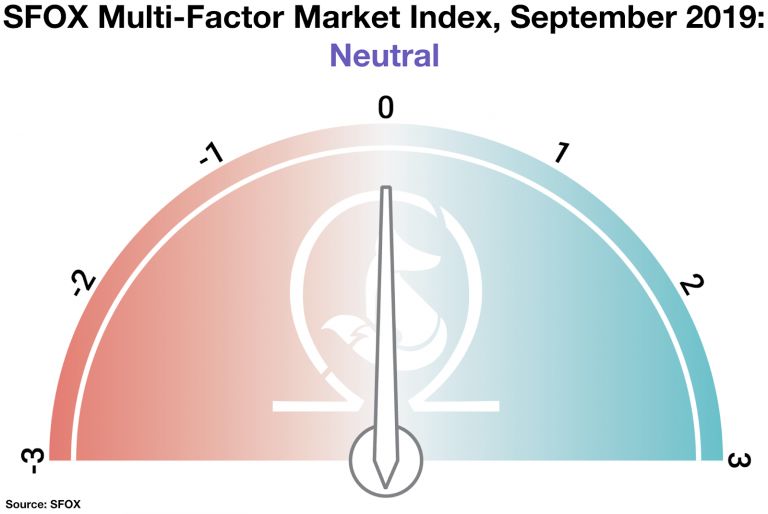
SFOX uses proprietary, quantifiable metrics to analyze three market factors: price dynamics, market sentiment, and industry sustainability to determine the monthly value of the index. It is calculated using a proprietary formula that combines quantitative data for search traffic, blockchain transactions, and moving averages. The index ranges from a height to a high level of bullishness.
As SFOX analyzes, the downturn in market sentiment seems to be related to fears that “primary” institutions may not be as prepared as some people think and are willing to enter the encryption field now, which may lead to the future of the industry. There is a broader uncertainty in development.
In a recent interview with SFOX, Tim Enneking, SFOX's client and first password fund manager, stressed that the crypto industry may not be large enough to involve large organizations. "The average size of the encryption fund is less than $10 million," Enneking said. If you put every crypto fund — including the Pantera fund I know the most, plus the gray bitcoin trust, it's not a fund; all of this together — it's just a cryptographic space. A small part, and the password space itself, as I said, is only a tiny part of the investment space. Therefore, large institutions cannot be involved on a large scale. ”
Perhaps the biggest lesson of the past month is that, as many media have predicted, institutional engagement should be measured by incremental infrastructure-based milestones rather than by separate product releases or administrative reviews.
In the past five weeks, expectations for further institutional and corporate investment in encryption technology have been challenged, especially since it was reported that Bakkt's physical settlement of bitcoin futures was poorly issued and PayPal withdrew from the Libra consortium. However, the worrying market sentiment brought about by these news may be exaggerated.
The following is a big event that has affected the trend of digital currencies in the past month.
Apple executives’ mixed interest in cryptocurrencies shows mixed institutional uncertainty about cryptocurrencies.
On September 5th, Apple Pay's vice president Jennifer Bailey told CNN that Apple is "focusing on cryptocurrencies" and that "it has interesting long-term potential." However, on October 3, Apple became the headline news. According to reports, CEO Tim Cook told Los Echos that he believes "a currency should be in the hands of countries" and he "is not satisfied with the idea of a private group setting up a competitive currency." .
Although these comments are not strictly inconsistent with Bailey's comments, they may be enough to worry that Apple's position on cryptocurrency is not as optimistic as expected. This suggests that some large companies may be uncertain about how they will be linked to encryption and blockchain technology in the future.
The CME Group announced that it will launch bitcoin futures options in early 2020, providing traders with new ways to reach Bitcoin.
The Chicago Mercantile Exchange (CME Group), known for its bitcoin futures market in the world of cryptocurrency, announced on September 20 that it plans to add bitcoin futures options to its cryptocurrency products early next year. On the day of the press release, the price of Bitcoin rose nearly 2%, from $9,972.96 to $10,166.38. The news marks the latest in slow but steady growth in the infrastructure of mature crypto-transaction tools.
After Bakkt launched the physical settlement of BTC futures, the market was unexpectedly cold, leading to a sharp decline in the cryptocurrency market.
Many people, including SFOX, pointed out that Bktkt's physical settlement of BTC futures, which was launched in September, is an event that is likely to drive the market as institutions gain more access to cryptographic trading tools. However, most people reacted fairly to its trading volume. As observed by Larry Cermak in the block, Bakkt's trading volume for the first week is comparable to the volume of transactions for some of the encrypted trading sessions during the 4-minute trading session.
In the four days after the release of Bakkt, the price of Bitcoin fell by nearly 18%, from $982.40 to $8045.88. The decline in cryptocurrency is likely to partly reflect the investor's emotional behavior in the absence of institutional influx, although this may not be realistic at first.
The SEC announced a $24 million settlement agreement with Block.one. Block.one paid a $24 million fine and said it received a significant exemption.
On September 30, the US Securities and Exchange Commission (SEC) announced a settlement with Block.one, the blockchain technology company behind EOS. The SEC previously accused it of the initial issuance of unregistered digital tokens (ICO) from June 2017 to June 2018, raising billions of dollars in funding in about a year. Block.one agreed to settle the allegations by paying a $24 million civil penalty.
The SEC said in detail that token sales were initiated after the agency issued the DAO investigation report. The company did not register the ICO as a securities issue, and most of the investors came from the United States.
Stephanie Avakian, co-director of the SEC's executive department, said: "Companies that offer or sell securities to US investors must comply with securities laws, regardless of the industry or the label on the investment products they offer." Because Block.one violated federal securities The registration of the law also imposes civil penalties.
Block.one officially issued a statement saying that it has reached a settlement agreement with the SEC, neither recognizing nor denying the SEC's findings. The fine is for ERC-20 token sales, the token is no longer in circulation or traded, and the token is not required to be registered as a security at the SEC. The fine is not for the actual EOS token currently in circulation. The SEC also grants Block.one a significant exemption for future business. Block.one will not be subject to certain existing rules and will generally apply to the same type of event.
A $24 million fine is not expected to have a significant impact on Block.one, as it represents only a fraction of the $4 billion initial financing.
This is a huge victory for EOS. In this incident: the SEC believes that Block.one has no fraud and criminal offences in the sales process.
The SEC believes that the proposed order describes and provides relevant content related to the token sales process, but does not involve criminal conviction, and does not violate any anti-fraud regulations, whether informed or uninformed. Therefore, according to the department's policy, Block.one will not be subject to "stricter" orders.
Giants such as PayPal, Visa, Mastercard, and eBay have withdrawn from the Libra Association, leading to further uncertainty about Facebook's private cryptocurrency business.
A few days ago, PayPal officially withdrew from the Libra Association, which was founded by Facebook to direct its private cryptocurrency project, Libra. Since the Senate and the House of Representatives held a hearing on Libra, people have been skeptical and worried about the consortium of major companies behind Libra, which has led some to doubt whether other companies may also withdraw. Although the Libra project itself does not involve BTC, some may think it represents a general advancement and acceptance of encryption and blockchain technology.
David Marcus, the Facebook executive and head of the Libra project, responded in his personal tweet: thanks to Visa and Mastercard for their last exit. The use of "great pressure" is somewhat understated. Respect each other's choices and wait for regulatory rules to clarify how Libra should advance.
He said that attention will be paid to interpreting the impact of this change on Libra's fate. In the short term, this is not a good news, but in a sense it is also a release. Stay tuned (Libra) for the next move. It is difficult to face this degree of change, but when people face so much pressure, they will know that they are doing something meaningful.
As of October 7, the S&P 500, gold and all major crypto assets have negative monthly-than-month earnings, suggesting that macroeconomic uncertainty may be working.
As of Monday, leading crypto assets, gold and the S&P 500 index all had negative monthly losses. ETH and the S&P 500 index had the smallest declines (-0.47% and -1.06%, respectively), while BSV and ETC had the largest declines (-36.83% and -30.16, respectively). But it may be that ETH has been boosted by news of increased gas restrictions and new support for bitpay, and the S&P 500 index may have been boosted by some as an active employment report.
The above is the impact of the news on the cryptocurrency in the past month. But what is worth remembering is that significant institutional involvement does not happen overnight: institutional involvement is more of a long-term trend and infrastructure development than a single product launch.
Disclaimer: This information should not be used as a basis for making investment decisions, nor should it be construed as an investment transaction. Trading digital assets involves significant risks and may result in loss of your investment capital. Therefore, you should ensure that you fully understand the risks involved and invest carefully. "Intra-chain participation" is only responsible for sharing information, does not constitute any investment advice, and all investment behaviors of users are not related to this site.
We will continue to update Blocking; if you have any questions or suggestions, please contact us!
Was this article helpful?
93 out of 132 found this helpful
Related articles
- Jinshan Yun Zhujiang: Layout BaaS Occupy Distributed Financial 4.0 Era
- 5,200 tobacco stores in France started selling bitcoins again, but this may not be a good thing.
- You can buy Bitcoin in a cardboard box. You can do this simple DIY.
- The Internet of Things and the blockchain are a panoramic fusion. Wang Yongjuan, a strategic support force letter, talks about “blockchain + internet of things”
- How to develop your own trading plan in the currency circle?
- Handwriting 丨 Joseph Lubin: The three major transformation directions of Ethereum and the moat
- To issue money and finance, you need to make a clear cut





